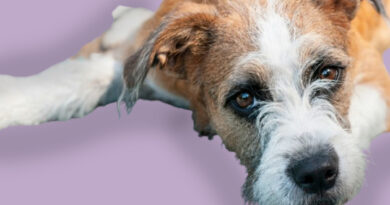Top 5 Dog Weight Loss Causes (2024)
Welcome to the exploration of the Top 5 Dog Weight Loss Causes in 2024, a guide crafted with love for our loyal companions. In the intricate tapestry of canine health, maintaining an optimal weight is a key factor for our furry friends’ overall well-being. However, when our beloved dogs start shedding pounds unexpectedly, it’s essential for pet owners to be well-informed about the potential causes. As we step into the year 2024, the realm of canine health is ever-evolving, with new insights and discoveries continually shaping our understanding. In this article, we aim to unravel the mystery of unexpected dog weight loss by exploring the top 5 causes prevalent in 2024. This journey is not merely a clinical exploration; it’s a holistic endeavor to empower dog owners with the knowledge and awareness needed to be vigilant stewards of their pet’s health. In this article, we will dive into the latest insights and unveil the top 5 dog breed weight loss causes of 2024, empowering dog owners with knowledge to ensure their pets live healthy and happy lives.

1) Digestive Dilemmas
Dogs’ general health depends on maintaining a healthy weight because obesity can cause a number of health problems. The path to Dog Weight Loss Causes is not without difficulties, though, and digestive problems are a regular problem pet owners encounter during this process. It’s crucial to recognize the reasons and treat digestive issues if you want your pet to lose weight in a healthy and effective manner.
Digestive Dilemmas During Dog Weight Loss Causes
Unexpected Dietary Shifts:
Abrupt changes to a dog’s diet, frequently made in an effort to cut calories, can cause upset stomachs. Due to their sensitive digestive systems, dogs may experience discomfort, vomiting, and diarrhea from sudden changes.
Not Enough Fiber Consumption:
For the digestive system to remain healthy, fiber is essential. Some pet owners may inadvertently lower the amount of fiber in their dog’s food by reducing the number of calories. Constipation and other gastrointestinal problems may result from this.
Insufficient Hydration:
Certain owners may undervalue the importance of maintaining proper hydration in their attempts to reduce calorie intake. Digestive issues may arise from dehydration’s impact on nutrition absorption and digestion.
Overuse of Prescription Weight-Loss Products:
Commercial weight-loss products could include excessive fiber or artificial additives that are hard on a dog’s digestive tract. Selecting premium, well-balanced food options is crucial, and before using such items, speak with a veterinarian.
Handling Issues Related to Digestion:
Modest Dietary Changes:
Avert stomach problems by implementing dietary adjustments gradually. Over several days, gradually reduce the old diet while introducing the new one. This reduces the possibility of an upset stomach and gives your dog’s digestive system time to adjust.
Healthy Eating:
Make sure your dog eats healthy, balanced food even when they are losing weight. To develop a personalized feeding schedule that addresses your dog’s unique requirements and includes the right amount of fiber and other minerals, speak with a veterinarian.
Sufficient Hydration:
Access to clean, fresh water should always be available. Digestion and general health depend on adequate hydration. If necessary, include wet food in your diet to help you drink more water.
Frequent Workout:
For long-term weight loss, combine regular exercise with a nutritious diet. Exercise improves general health and stimulates the digestive system.
Speak with a vet:
See your veterinarian before starting your dog on a weight-loss program. They may monitor your dog’s development, suggest portion quantities, and offer advice on a healthy diet. A veterinarian can assist in determining and treating the underlying causes of any digestive problems.
Pet owners can help their canine companions lose weight in a way that is both successful and easy on the digestive system by encouraging regular exercise, encouraging hydration, making progressive dietary modifications, making sure nourishment is balanced, and getting professional advice.
2) Dental Woes and Waistlines
Dogs need to be kept at a healthy weight as part of proper pet ownership. Regretfully, there are instances when the path to Dog Weight Loss Causes presents unforeseen difficulties, such as dental problems. Achieving a healthy weight and maintaining excellent oral health are interdependent and must be balanced for our pets’ overall wellbeing.
Dental Woes and Waistlines Dog Weight Loss Causes
Not Enough Opportunities to Chew:
Reducing treats or switching to softer food options are common weight reduction regimens that reduce a dog’s natural chewing motions, which help keep their teeth clean. Too little chewing time can lead to the accumulation of tooth plaque and tartar.
Inadequate Dietary Resources:
Certain diets designed to reduce weight may be deficient in important nutrients, such as those that are vital for good oral health. Deficits in some nutrients might impair a dog’s immunity, increasing their vulnerability to dental issues.
A Higher Chance of Periodontal Disease:
Dogs who are prone to obesity may also have an increased risk of gum disease. Too much weight and poor dental care might foster an environment that is favorable to tooth decay and gum disease.
Changes in Eating Habits:
Oral health in dogs can be affected by changes in meal frequency and type, which are typical during weight loss programs. Oral problems may be exacerbated by irregular eating habits or a diet deficient in essential nutrients for oral maintenance.
Handling Waistlines and Dental Problems
Opt for dental-friendly diets to lose weight:
Choose diets for weight loss that have dental care components. Certain commercial dog diets are made with particular kibble sizes or textures that help lessen the accumulation of plaque and tartar, which is intended to improve oral health.
Add-on Dental Chews:
Give your dog dental treats or chews as part of their regimen. These mouthwash formulations are designed to encourage chewing, which helps to reduce tartar buildup and remove plaque.
Frequent dental examinations:
Plan routine dental examinations at the vet to keep an eye on your dog’s oral health. In order to treat current dental problems, professional cleanings might be required. Your veterinarian can also suggest an oral hygiene regimen that is appropriate for your dog’s particular needs.
Keep Your Diet Balanced:
Make sure the diet your dog is on to lose weight is nutritionally balanced and takes dental health and weight control into account. To choose a food that promotes your dog’s general health, speak with a veterinarian.
Give out dental toys:
Provide safe chewing objects or dental toys to promote natural tooth cleaning. In addition to offering mental activity, chewing on the right toys can help lower plaque and tartar accumulation.
Regular dental hygiene practices:
Establish a regular dental hygiene regimen for your dog at home, which should include brushing their teeth. For optimal dental hygiene, use a toothbrush that is suitable for dogs and toothpaste that has been authorized by veterinarians.
Pet owners can make sure their dogs enjoy a journey towards a healthier weight without sacrificing their dental health by selecting dental-friendly diets, adding dental chews as supplements, scheduling routine veterinary check-ups, keeping a balanced diet, offering dental toys, and establishing a regular oral care routine.
3) Parasitic Pounds
Starting a weight-loss program for your dog is a thoughtful and ethical move. The existence of parasitic pounds is one of the unforeseen difficulties that pet owners could face. Because parasites can have a major negative effect on a Dog Weight Loss Causes and general health, losing weight effectively requires a multifaceted approach that takes care of both the excess weight and the underlying parasitic problems.
Parasitic Pounds during Dog Weight Loss Causes
Inside Parasites:
In a dog’s intestines, worms, including roundworms, tapeworms, and hookworms, can live and consume nutrition meant for the dog. Despite eating enough food, this causes weight loss and nutritional deficits.
Outside parasites:
Dogs who are itchy and uncomfortable from fleas and ticks may lose weight and have fewer appetites. Furthermore, some parasites carried by ticks can spread diseases that worsen a person’s general health.
Intestine-related parasites:
A dog’s gastrointestinal tract may get infected with protozoa and other tiny parasites, leading to inflammation, diarrhea, and impaired food absorption. Loss of energy and weight loss may follow from this.
Diminished Immune Response:
Dogs with parasitic infestations may have weakened immune systems, rendering them more vulnerable to illness. The ensuing ailments may be a factor in weight loss and a deterioration in general health.
Taking Care of Parasitic Pounds and Losing Weight
Frequent visits to the vet:
Plan routine veterinary examinations to keep an eye on your dog’s general health and look for any indications of parasite infestations. Frequent fecal investigations can aid in the early detection of internal parasites and their treatment.
Medication for Preventing Parasites:
Regularly give prescriptions for parasite prevention that have been prescribed by veterinarians. By shielding your dog against common external and internal parasites, these drugs can stop infestations and the weight loss that results from them.
Quick Infestation Treatment:
In the event that parasite infestations are found, treat them as advised by your veterinarian. To get rid of parasites and improve your dog’s health, try deworming drugs and targeted flea and tick treatments.
Cleanliness and Adequate Hygiene:
Keeping your dog’s living space clean will lower the likelihood of parasite infestations. To reduce the number of parasites in your home, regularly clean and sterilize your toys, bedding, and living areas.
Healthy Eating:
When treating parasite problems, make sure your dog eats foods rich in nutrients. Speak with your veterinarian to determine the best diet for your dog’s needs in terms of nutrition and weight loss.
Keep an eye out for parasite signs:
Watch out for symptoms of parasite infections, such as gastrointestinal problems, weight loss, fatigue, and changes in appetite. Early detection stops more health issues and enables prompt treatments.
Sustain a Healthy Exercise Program:
Frequent exercise is vital for good health in general and for preventing parasites in particular. Your dog’s immune system is strengthened by a regular exercise regimen because playing outside can expose them to several parasites.
A comprehensive approach to managing parasite pounds in dogs includes regular veterinary check-ups, prophylactic drugs, timely treatment for infestations, good sanitation, balanced feeding, close supervision, and a regular exercise regimen. Pet owners may help their beloved pets reach and maintain a healthy weight while boosting overall wellness by emphasizing both parasite prevention and weight loss.
4) Stressed Out and Slimming Down
Maintaining a healthy weight for your dog is a crucial part of being a responsible pet owner. However, unforeseen obstacles can occasionally accompany a dog’s weight-loss journey, and stress is a prevalent factor in these situations. Like people, dogs can experience stress, which can lead to health problems like Dog Weight Loss Causes. In order to guarantee that their pets lead balanced and healthy lives, pet owners must comprehend the link between stress and weight loss.
Stressed Out and Slimming Down during Dog Weight Loss Causes
Shift in the surroundings:
Since dogs are creatures of habit, abrupt changes in their surroundings, like moving to a new house or welcoming new family members or pets, can be upsetting to them. Stress has the potential to reduce appetite, which leads to weight reduction.
Anxiety related to separation:
Long stretches of time spent alone might cause separation anxiety in dogs. As a reaction to emotional discomfort, this anxiety may cause decreased food intake, digestive problems, and weight loss.
Fear or Severe Experiences:
Dogs may become stressed out if they are exposed to frightening circumstances or traumatic events, such as fireworks, loud noises, or traumatic experiences. Their eating patterns may be affected by the physiological reaction to stress, which could result in weight loss.
Health Issues:
Dogs may experience stress due to underlying medical ailments such as persistent pain or gastrointestinal issues. These illnesses’ related discomfort may lead to a decrease in appetite, which in turn aids in weight loss.
Handling dog weight loss and stress-related slimming
Determine and reduce stressors:
Keep an eye on your dog’s behavior to spot any possible stressors. As soon as they are detected, try to reduce or get rid of them. Creating a secure and cozy atmosphere helps lessen the impact of stress on weight loss.
Create a schedule:
Dogs thrive on consistency, so keeping a regular daily routine can reduce stress. Establish regular play dates, walks, and feeding schedules for your dog to help them feel safe and predictable.
Encouragement that is constructive:
Employ strategies for positive reinforcement to promote healthy habits and reduce stress. When your dog behaves well, give them attention, rewards, and praise to help create a safe and happy environment.
Establish cozy and secure areas:
Make a cozy and secure haven where your dog can go to unwind after a stressful day. This could be a comfortable bed, a peaceful nook, or a special crate. Having a safe haven can make children feel more relaxed and capable of handling stress.
Progressive Loss of Weight:
If stress is the cause of your weight loss, start by taking care of the underlying stressors. After the tension has subsided, collaborate with your veterinarian to create a balanced, moderate weight-loss program that is customized to your dog’s individual requirements.
See a veterinarian for advice:
To rule out underlying medical concerns, see a veterinarian if weight loss attributable to stress doesn’t go away. A comprehensive assessment can assist in determining any medical conditions influencing weight loss and recommend the best course of action.
Think about modifying your behavior:
Consider working with a professional dog trainer or behaviorist to employ behavior modification approaches in times of extreme stress or anxiety. This can assist in addressing behavioral difficulties that are at the root of stress-induced weight loss.
Pet owners can assist their dogs in reaching a Dog Weight Loss Causes while enhancing general well-being by recognizing and resolving stresses, creating a routine, employing positive reinforcement, offering comfort and safe spaces, and speaking with a veterinarian for a customized weight loss plan. Understanding the link between stress and weight loss is essential to providing our cherished dog friends with a happy and fruitful weight loss experience.
5) Behavioral Battles
It’s admirable that you and your dog have decided to embark on a weight-loss journey together in order to ensure their general wellbeing. Unexpected difficulties could arise along the way, though, and one frequent obstacle is the onset of behavioral conflicts. Comprehending the correlation between behavior and weight reduction is crucial for pet owners who aim to provide their animals with a well-rounded and effective strategy for reaching and sustaining a healthy weight.
Behavioral Battles during Dog Weight Loss Causes
Food-Related Violence:
Aggression over food can occur in dogs, particularly if they perceive that their availability of food is limited. This behavior can impede attempts to limit portions and maintain weight by taking the form of snarling, snapping, or protecting their food.
Intending and overindulging:
Since dogs are skilled at pleading for food, losing weight may lead to more requests for extra meals or treats. Begging can cause overfeeding, which can impede weight control efforts and cause behavioral issues.
Behaviors Related to Stress:
Dogs may experience stress due to dietary and habit changes during weight loss, which may result in a variety of behavioral problems such as excessive barking, destructive chewing, or withdrawal. These habits may have an adverse effect on their general health and impede their efforts to lose weight.
Opposition to Exercise:
Including exercise in a dog’s routine might be difficult since some dogs may show resistance or hesitation. A behavioral obstacle to reaching and keeping a healthy weight may be this resistance.
Taking Care of Behavioral Conflicts in Dog Weight Loss
Modest Dietary Adjustments:
Make incremental dietary adjustments to reduce hostility related to eating. This keeps your dog from feeling frightened or hungry while they learn to adapt to different serving sizes and varieties of food.
Encouragement that is constructive:
Techniques for positive reinforcement can be used to promote desired actions. When your dog follows the weight reduction plan or behaves appropriately throughout meals, give them praise, rewards, or more playtime.
Create a feeding schedule:
Establish a regular feeding schedule to lessen the tension and anxiety that come with eating. Because dogs like consistency, having a set routine can reduce behavioral conflicts around mealtimes.
Track treatment intake:
Treat consumption should be controlled because too many treats might lead to weight gain. Treats with fewer calories should be chosen and used carefully to provide positive reinforcement. To find the right treatment allowance, speak with your veterinarian.
Frequent Workout Schedule:
Create a regular exercise schedule that is adapted to your dog’s requirements. Frequent exercise helps people lose weight and improves their mental health, which lowers their risk of behavioral problems.
See a veterinarian for advice:
See a veterinarian if behavioral conflicts continue in order to rule out any underlying medical conditions that may be causing the behavior. A thorough health evaluation can help the weight loss plan and direct the right measures.
For our cherished canine companions, a comprehensive strategy for overcoming behavioral challenges and promoting a joyful and successful weight loss journey includes professional training, interactive activities, frequent exercise, and veterinarian consulting.
Conclusion
It is critical for responsible pet ownership to stay up-to-date on the most recent findings regarding the causes of Dog Weight Loss Causes loss in the ever-changing field of canine health. Dog owners may prevent illness and ensure their pets live happy, healthy lives by being aware of these top 5 reasons. A balanced diet, routine veterinary treatment, and a watchful eye for behavioral changes are the essentials for navigating the intricacies of canine health in 2024 and beyond.




